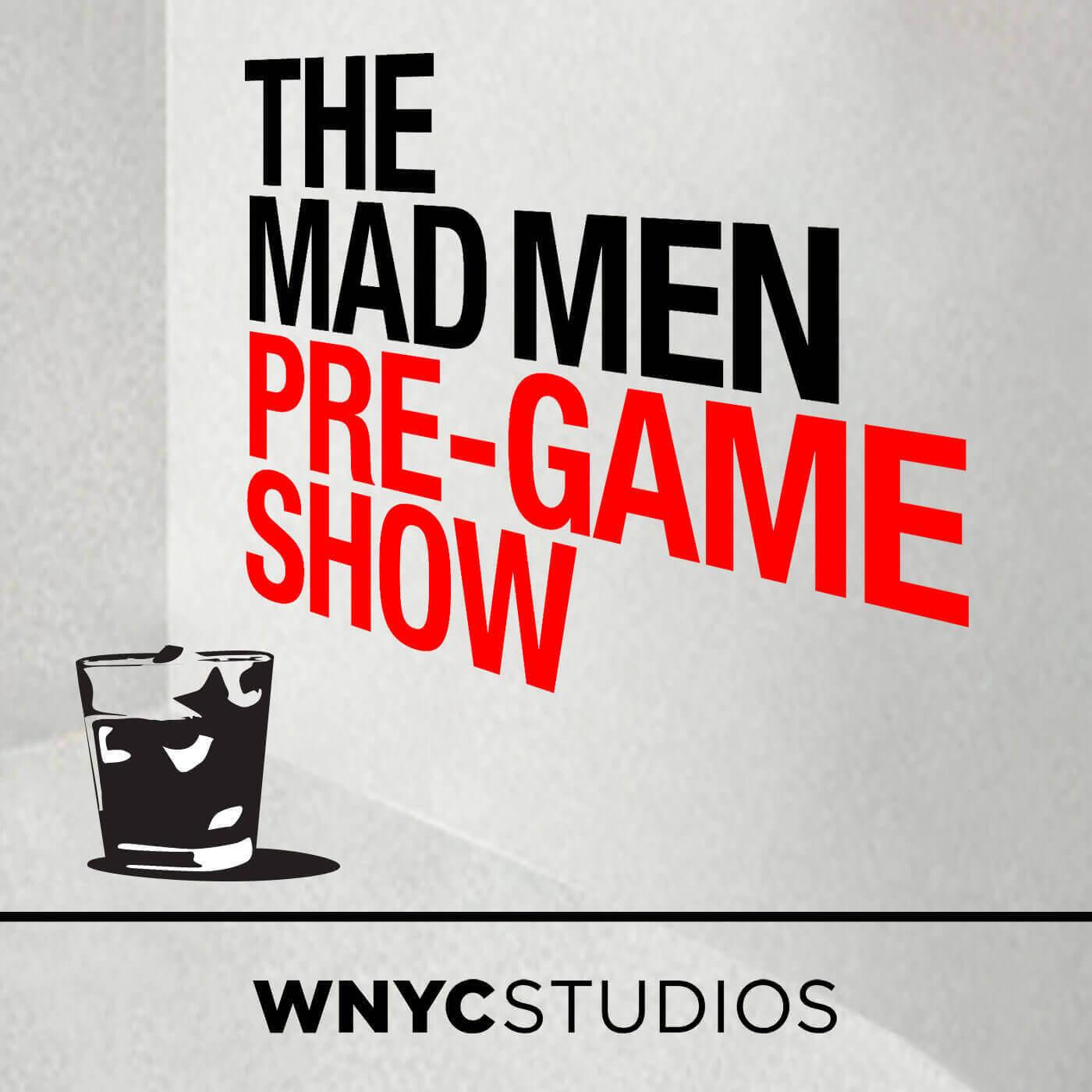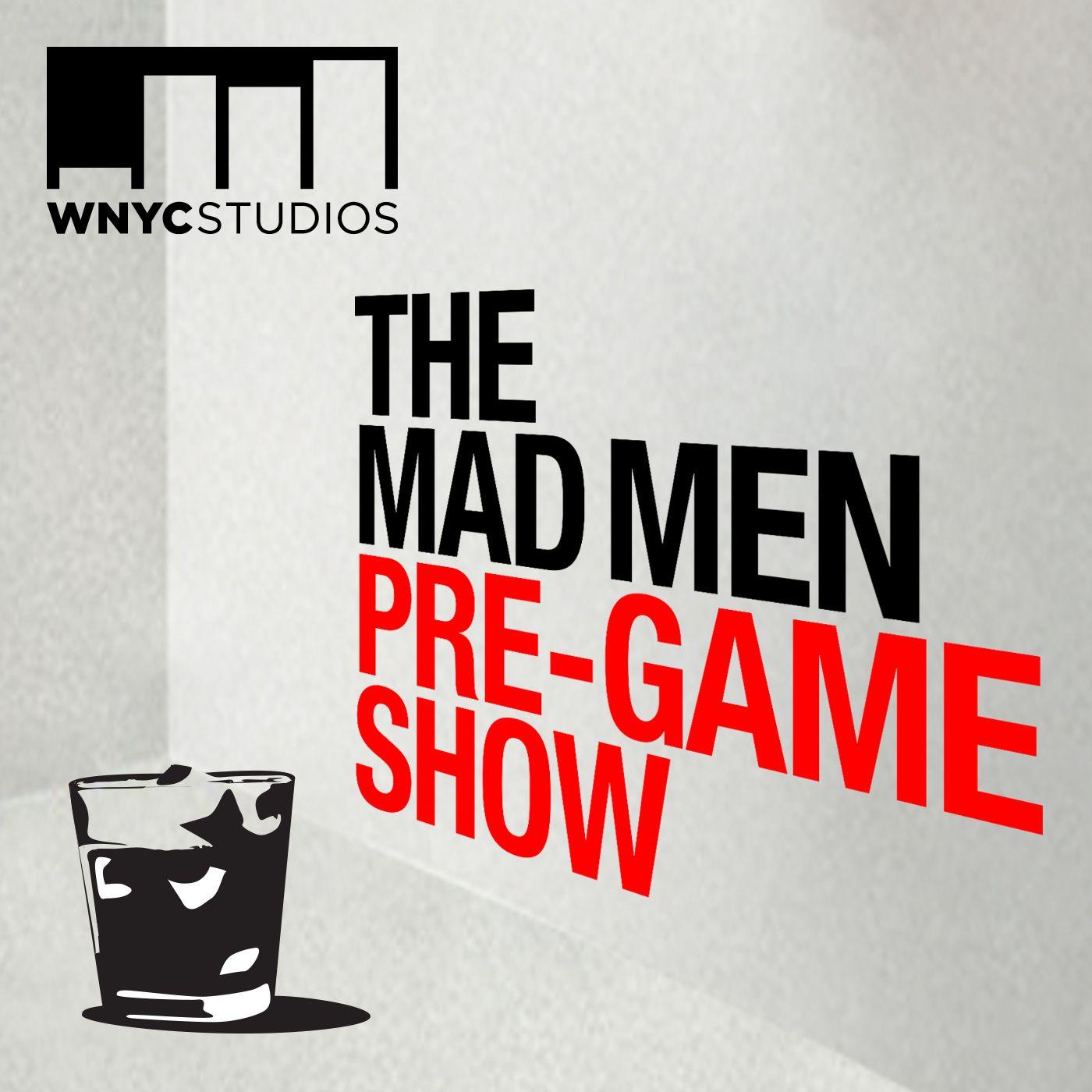The Mad Men Pre-Game Show
The booze-filled, drug-addled, technicolor roller coaster that is Mad Men will finally end its epic, seven-year run in just eight short weeks. Relive the highs and lows, the affairs and the sudden deaths, the lies and the cold hard truths, in this short-run podcast series. Host Ellen Horne will be talking to writers, historians, psychoanalysts and her fellow show fanatics about what Mad Men means and where it’s headed.
by host Ellen Horne
In the wake of the Mad Men finale, there was some debate over what it all meant and how strange it was that one Coca-Cola ad should have such a prominent moment on the sunny Big Sur (or Italian) hillside. But as Jon Hamm and Matt Weiner have now piped up, the only thing to resolve is whether that ending felt true and right, or a little too tidy.
While we at the Mad Men Pre-Game Show are loath to Monday- (or Friday-) morning quarterback this, we’d like to humbly point out that we flagged that Coke ad a while ago—not for its iconic status in the history of advertising, but because it was produced by Roquel “Billy” Davis’ music division at McCann. Ericka Blount Danois pointed out the opportunity to show an African American in something more than a walk-on role, and we’re still sighing heavily along with her that Mad Men missed that opportunity.
And Don’s “moment of actualization”? Weiner’s depictions of hippie counterculture had always been so mocking. The irony of a realization (at a place designed for spiritual awakenings) is not lost on us. We’d had a hunch that the finale would wrangle with the counterculture, and given Mad Men’s track record with that topic (Roger’s daughter moving upstate to join the "dirty hippies," or Paul Kinsey as a Hare Krishna), it feels fitting that the burgeoning New Age should become an object for Don’s exploitation. The show used the countercultural quest for meaning as a tool to resolving Don’s character arc. Did anyone else think that “Leonard” - the office drone that Don hugs in the encounter circle - looks a little like Matt Weiner? Even real estate developers get a more generous treatment than hippie soul-searchers, yet both are doomed to exit stage left when they are no longer useful.
Many TV shows have been set in the workplace, with the cast playing out a work-family melo-dramedy, but Mad Men had a very particular power source fueling the saga: Maternal abandonment. We’d touched on this when we spoke to psychiatrist and author Dr. Stephanie Newman. The ending for her really underlined what a tragic character Don is.
“He has the insight that ‘the real thing’ is connection with others,” she says. “Ironically, it is precisely this type of real connection that has and continues to elude him.”
In the three “Person-to-Person” calls that Don makes, only Peggy suggests that he’s got a ‘home’ to return to, or makes even the slightest suggestion that she wants anything from him. She gamely asks him, “Don’t you want to work on Coke?”
Stephanie Newman continues: “Many characters on the show play against a background of deprivation, loss, and longing. As the woman at the ashram says to [Anna Draper’s daughter], 'Your baby is going to spend the rest of his life staring at the door.' Mothers leave in the world Weiner has created.”
In the final installment of our podcast, we kicked off our around-the-office montage of predictions with Bob Garfield, co-host of On The Media, and he went all-in on the defenestration theory. (While Amy Pearl didn’t quite get Stan and Peggy’s baby as she predicted, we suspect she wasn’t unhappy with their resolution, even if we found it saccharine.) As the days pass, I’m finding myself increasingly content with the end. I was hoping that Don would become John Updike, but that he returned to the only family that really wanted him -- the ad world -- felt like it fit.
When I checked back with Bob to see what he thought of the finale, he told me, “I find it weird that the ending was such a wry little joke. After all his tribulations and angst and caddishness and self-indulgence and lies, he finds himself in a situation neither Dick nor Don could believe in—a new age ashram—where he gets a glimmer of revelation and conceives one of the most iconic ads ever. Even the little chime tone as the idea strikes, which is like from a Roadrunner cartoon. Ah! So in the end, what Don/Dick is...is an ad man. I mean mad man.
“Better he should have jumped.”
Don confronts his life deceptions in Kansas, Pete is wooed by the prospect of a simpler life—maybe including Trudy—and Betty gets a devastating diagnosis.
Then, Ellen calls up Battlestar Galactica showrunner Ronald D. Moore—who's in Scotland filming season two of Outlander—to hear how a finale gets conceived, and how to stick the landing. She also talks to Carly Mensch, a TV writer who worked on the final seasons of Weeds and Nurse Jackie, and is now a writer at Orange Is The New Black. Carly drops some writers' room wisdom on where to go looking for hints about how it'll all end.
Don goes on the run, Joan battles egregious sexism at McCann and Roger and Peggy send off the SC+P offices in proper fashion.
Then, Ellen talks with video producer Amy Pearl. She makes videos about New York for New York Public Radio which are strange, funny, touching short films. But we’re talking to her because she’s the creator and director of our favorite Mad Men inspired video: “Meow Men.” They talk Don, nostalgia, and of course, cats.
Peggy finally talks about the baby she gave up for adoption, and the team gets back together for one last pitch to save their agency.
It was an episode people have been waiting for a long time, so what else do we expect? Mad Men has taken a lot of knocks for being - perhaps unrealistically - lily white in its depiction of the 1960s. Host Ellen Horne talks about the show's blind spots when it comes to race with Ericka Blount Danois, a writer who's tackled the topic for Ebony, and Gilbert Cruz, TV Editor for The New York Times, who says the show might not have gotten it as wrong as we think.
Don hits on a 17 year old! A grown-up Glen propositions Betty! And Sally sells herself on the idea of a one-way bus ticket.
There's a whole lot of persuading going on. This is a show about advertising, after all. But how realistic is its portrayal of that topic? Host Ellen Horne talks to her brother about particularly egregious "badvertising." And Colin Mitchell and Matt Creamer—two real-life ad men—dissect a few of the show's standout product pitches.
Megan got her divorce, Don got dumped by the diner waitress and Harry Crane's true pervy nature was revealed. But whither Sally Draper? We miss that kid.
This week, we talk to On the Media's Brooke Gladstone about growing up Sally, a girl who "is going to get really angry" really soon. And we bring in writer Jess Bennett to unpack the ongoing and very disturbing war between two would-be allies, Joan and Peggy.
As we learned on last week's episode, the partners at the agency are now filthy, stinking rich. So why are they all still so unhappy? While we saw some glimmers of hope for Don, Peggy and Ken in the first episode of this second half of the season, you know it's a matter of time before self-sabotage comes into play.
We'll talk with Invisibilia's Lulu Miller and Alix Spiegel, as well as Linda Holmes, host of Pop Culture Happy Hour, about how the characters on this show are "OK," but they're never actually ok.
Then we pay a visit to therapist Stephanie Newman, author of "Mad Men on the Couch," to see what exactly everyone's problem is. Does it have even a name? In the case of Don, at least, she'd call it narcissistic personality disorder.
At its best, Mad Men brilliantly deconstructs things like family dynamics, corporate influence, and the gigantic cultural shift that took us from Eisenhower's '50s to the louche '70s. It paints a vivid portrait of America in the 1960s and - at the same time - shows us just how little has changed since then.
As we dive back into Season 7 for the show's final few episodes, we'll bring everyone up to speed on where we left off - the agency up for sale to McCann, Peggy leaping out from Don's shadow, and a nation newly launched into the space age. Joining us to talk about what's real, what's not and what we should be looking for is historian and writer Audra Wolfe, whose work focuses on the role of science in “soft” diplomacy during the Cold War. We'll also hear from Laura Walker, CEO of New York Public Radio, about her own connection to the heyday of boozy Madison Avenue business.


